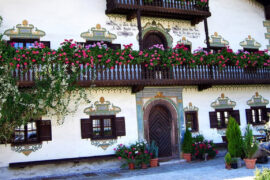
¨Money often costs too much.¨
Ralph Waldo Emerson

Use the Local Currency over US Dollars Traveling Abroad
I am always surprised how often tourists (even some who are not Americans) believe that vendors overseas prefer US dollars over the local currency. Since the US currency is strong, tourists erroneously assume that every merchant will give them a reasonable exchange rate to get the US dollar. (A strong currency increases in value over time versus the local currency).
However, Fifty Plus Nomads should use local currency for several reasons.
- The dollar is sometimes weak. (Throughout most of the George W Bush administration, most foreign currencies, even the Mexican peso, were strong against the US. dollar).
- The majority of vendors do not even accept the US currency because the vendors:
- Do not have enough US.dollars to get a reasonable exchange rate.
- Have to take the time and effort to exchange dollars into their currency.
- Most merchants can’t save dollars until they have enough to get a favorable exchange rate or benefit from the US Dollar’s strength. Large hotels in places like Cancun love US dollars because they can save the dollars until they get the most favorable exchange rate. (They also use the dynamic currency exchange rate for tourists, which means you lose 7% on every transaction).
- Many locals are not used to US Dollars. They can’t spend dollars in local stores, nor can they put the dollars in a local bank account.
- Most importantly, you will not get a favorable currency exchange rate from most merchants abroad. It is generally better, instead, to use credit cards and ATMs.


When Can You Use US Dollars Traveling Abroad?
- On the US-Canadian and US-Mexican borders.
- Places in Mexico with many American tourists, like Cancun or Puerto Vallarta.
- With many cruise ship passengers (and then only when the ship is in port). As a result, most travelers can only expect that vendors will even take US. dollars when they visit cities:
Even in these cases, receiving a reasonable exchange rate from vendors is rare. Usually, it will cost you 10-15% more to use US dollars than if you used the local currency.
Let’s look at why it is usually a bad idea to use US dollars even where they are accepted. Assume, for example, that you use US dollars in most Mexican beach resorts (like Puerto Vallarta or Cancun).
Most vendors merely convert the prices using an exchange rate that is easy to calculate without a calculator. For example, the US dollar was worth 12 Mexican pesos for several years. Yet, most vendors quoted prices in US dollars based on a 10 pesos to 1 dollar exchange.
In other words, if you wanted to buy something that cost 120 pesos, the vendor would ask you for $12 US dollars. (120 pesos/10 pesos).
However, if you paid them with pesos, you would have only paid around $10 for the same item (120 pesos/12 pesos to a dollar).

Where is Using US Dollars Traveling Abroad a Good Idea?
I seldom use US dollars while traveling abroad.
That said, there are places where US dollars are helpful, including countries where:
- Locals use US dollars (like Costa Rica and Haiti) for large transactions.
- The US dollar is the official currency (Panama, Zimbabwe, Ecuador, and some islands in the Caribbean).
- The exchange rate is pegged to US currency. (In Belize and Barbados, their currency is worth 2 for a U.S. dollar).
- The local currency is fragile (Cambodia, Liberia, Nicaragua, Myanmar, and Somalia) or is temporarily weak (I found this case in Argentina in 2014).
- It can be hard to find functional ATMs (most sub-Saharan Africa, some former Soviet republics, and Haiti).
I also often use dollars in ports on cruise ships because I:
- Usually, do not spend much money in ports, so the fees are relatively high for a small ATM withdrawal.
- Do not want to waste time finding an ATM.
- Can usually easily find vendors that accept credit cards and dollars.
- Want to avoid getting stuck with a lot of foreign currency after the ship sails away for the next port.

Fifty Plus Nomad offers personalized workshops and courses in Spanish, English, Living and Traveling in Mexico, and Long-Term Travel Book a Two-hour Free Sample Introductory Session

Want Other Using US Dollars Traveling Abroad Related Tips?
Check out this post from Moneyunder30.com,










